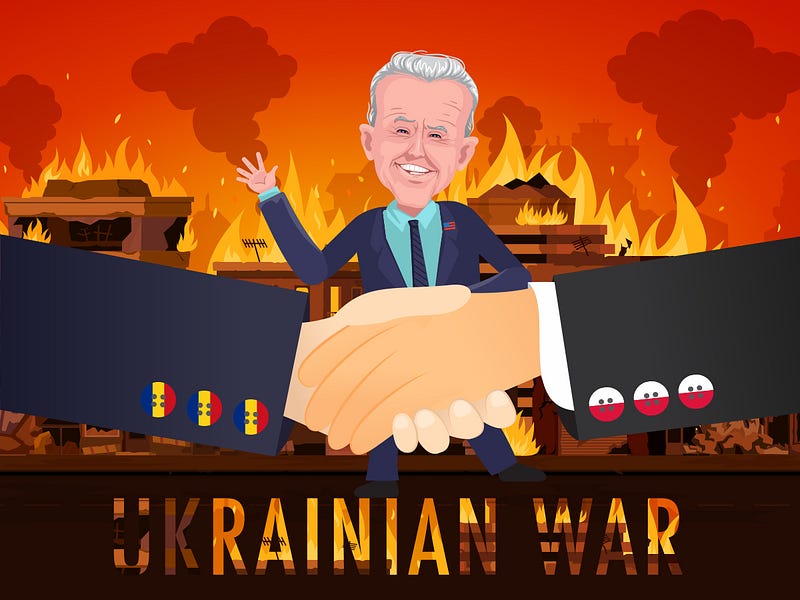Much More Than a New Friendship

Those interested in international affairs may observe an interesting situation in Eastern Europe, namely, that, on the on the Eastern flank of NATO, next door to war-torn Ukraine, and, most likely, under the auspices of the United States a completely new friendship is being formed between Poland and Romania, focused on both national and international interests.
Both Romania and Poland are considered as committed members of the EU, and they both are seen as strong pillars of NATO in this part of Europe. Both countries maintain strong ties with the United States, which, in my opinion, is a key factor in their recent friendship.
The question of how Poland helps Ukraine should usually not be completely skipped, but given that detailed reports are available about this issue, let me emphasize one single figure, namely that so far Poland has provided a safe haven for at least 1.5 million Ukrainian refugees fleeing the war. A little comparison: more than 126,000 refugees granted temporary protection in Romania (as of April 2023).
As far as Romania concerned, it should be emphasized that Bucharest also plays a key role in helping Ukraine’s fight against Russia. In the military field, Romania backs Ukraine just as much as Poland does, mostly in the field of training Ukrainian soldiers, as it appears from the recently disclosed secret Pentagon Papers.
Apart from a similar approach to Russian aggression towards Ukraine, which originates mainly in their strong Atlantic relations, what else connects the two mentioned states?
Both Romania and Poland participate in the two major forms of cooperation in the region, the Three Seas Initiative (TSI) and the B9 (Bucharest Nine) format. While Romania is strengthening its leadership on the security dimension in the Black Sea Region and also in Moldova, Poland plays a similar role in the Baltic states.
As for the Republic of Moldova, it should be noted what an extremely important step Bucharest has taken in recent months in order to expand its zone of influence in that country: President of Moldova Maia Sandu, a Harvard graduate and former World Bank official in the United States, revoked the status of the Moldovan language as state language, at the same time, granting the same status to the Romanian language. (The efforts of the Romanian diplomacy to achieve this success definitely deserve applause!) Compared to such a demonic but very effective Romanian foreign policy, analogous smart solutions can be observed on behalf of Poland as well. As proof how effectively Poland can pursue its interests abroad, a law was adopted in Ukraine last year, which grants a special status to Poles, ’as a sign of gratitude to the Polish people for their solidarity and support of Ukraine’, as President Zelenskyy suggested. (I cannot help making a malicious remark about the aforementioned ’gratitude’: in all likelihood, the same ’gratitude’ resonated in the prayers of the Moldovan people for the change of their former state language to Romanian…)
Under such circumstances, in the 13th months of the war in Ukraine, Romania and Poland hold a joint meeting of the governments, followed by Romania-Poland Economic Forum, with the participation of the two Prime Ministers. The two countries decided on the strengthening of the bilateral cooperation in the fields of defence, digitalization and economy. In addition to that they reaffirmed their support for Ukraine as long as necessary; and they also agreed to step up support for the Republic of Moldova, in the context of this state’s vulnerability due to Russia’s war in Ukraine.
’I see in Romania an excellent ally in the struggle for our common interests. I believe that in the triangle formed by Ukraine, Romania, and Poland, it will be possible to develop important strategic plans and shape a secure European future’, Mateusz Morawiecki said after the meeting with his Romanian counterpart. The head of the Polish government also noted that cooperation between Poland, Romania and Ukraine would allow the creation of a ’new economic community in the region of Central and Eastern Europe’.
What was started in Bucharest on the 4th Intergovernmental Meeting of Romania and Poland was continued in Washington D.C., where Mateusz Morawiecki arrived on an official visit (11–13 April). ’Old Europe believed in an agreement with Russia, and old Europe failed. There is a new Europe, Europe that remembers what Russian communism was. And Poland is the leader of this new Europe. Poland wants to become a bedrock of European security,’ Mr Morawiecki told the American Vice President, adding that, just like in the times of communism, ’America has once again become a source of hope for a free Europe’.
That is it, period, the end of the sentence, and the end of the guessing game as well: Poland has declared itself the leader of a new bloc in Eastern Europe. Apart from Poland, Romania could become another strong member of this bloc. In the triangle formed by Poland, Romania and Ukraine, a new economic community of over 100 million inhabitants is taking shape, in which Moldova also could be involved in the future. While Poland, with the effective assistance of the U.S. easily pulls the Baltic states into its orbit, Bucharest will attract Moldova closer and closer to itself, forming a completely new alliance in Eastern Europe. All of this, of course, cannot be called an earthquake that will change the world order, but, from the perspective of the United States, the abovementioned developments in Eastern Europe can be seen as a glorious victory.
Whatever happens in Ukraine, whatever the outcome of the war will be, a new buffer zone with considerable economic potential is being formed in Eastern Europe. In a political sense, the above processes can also be interpreted as an effort to create an anti-Russian coalition in Eastern Europe, a kind of counterweight to ’old Europe’, which, unlike ’old Europe’, rejects any negotiations with Russia.
Leave a Reply